Publications
- Improving professional management in local public enterprises
-
State-owned enterprises – The giants of wasting public resources
-
Public-Private Partnerships – Corruption Risks and Overt Violation of the Law (Case Studies)
- Corruption Risks in Regulations and Lobbying
other PUBLICATIONS
COMMENTARY ON CERTAIN PARTS OF THE INTER-PARTY AGREEMENT ON ELECTION CONDITIONS
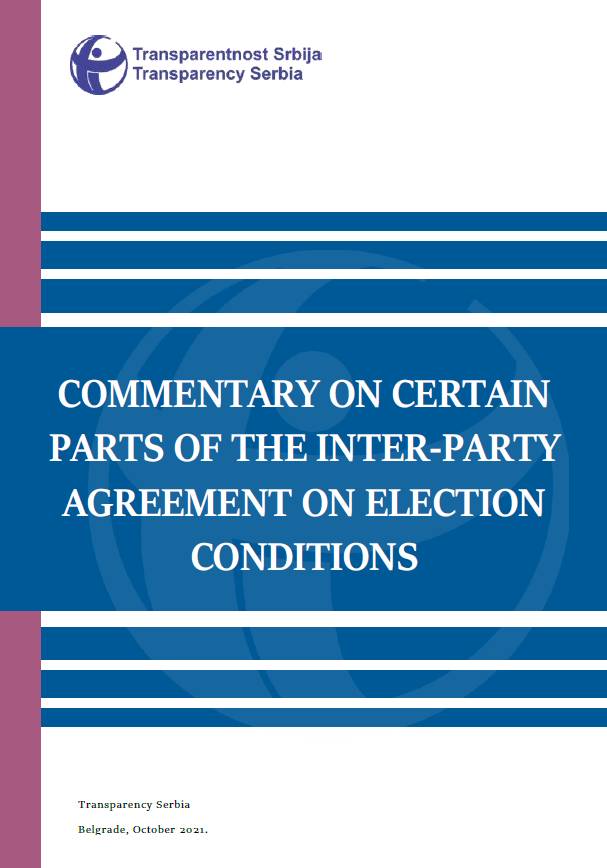 |
|
|
Transparentnost Srbija
ul. Palmotićeva 31
Beograd
Tel + 381 (0) 11 323 78 05
Faks +381 (0) 11 323 78 05
This email address is being protected from spambots. You need JavaScript enabled to view it.
www.transparentnost.org.rs
Priprema za štampu:
Transparentnost Srbija Beograd
LOCAL SELF-GOVERNMENT TRANSPARENCY INDEX 2021
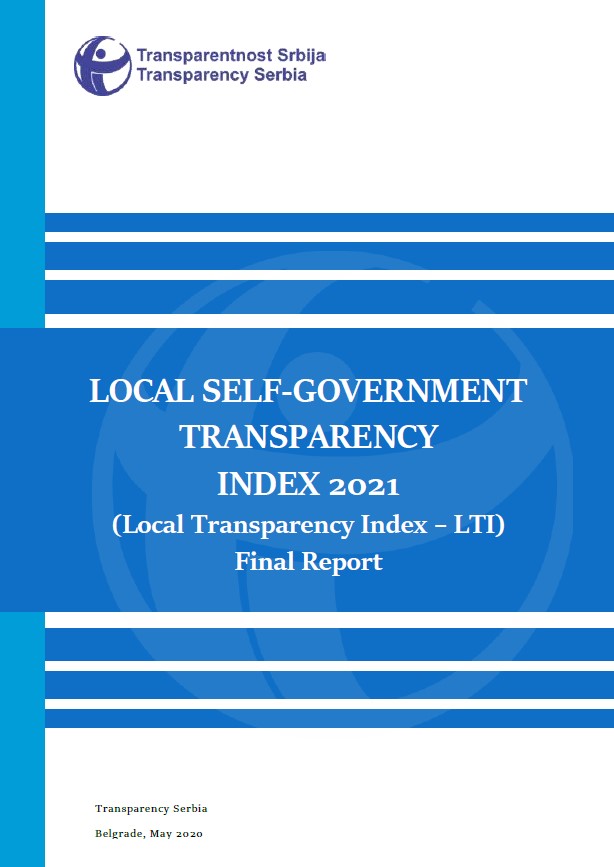 |
|
|
Transparentnost Srbija
ul. Palmotićeva 31
Beograd
Tel + 381 (0) 11 323 78 05
Faks +381 (0) 11 323 78 05
This email address is being protected from spambots. You need JavaScript enabled to view it.
www.transparentnost.org.rs
Priprema za štampu:
Transparentnost Srbija Beograd
PUBLIC PROCUREMENT AND PUBLIC-PRIVATE PARTNERSHIPS – BETWEENSOLID REGULATION AND POOR PRACTICE
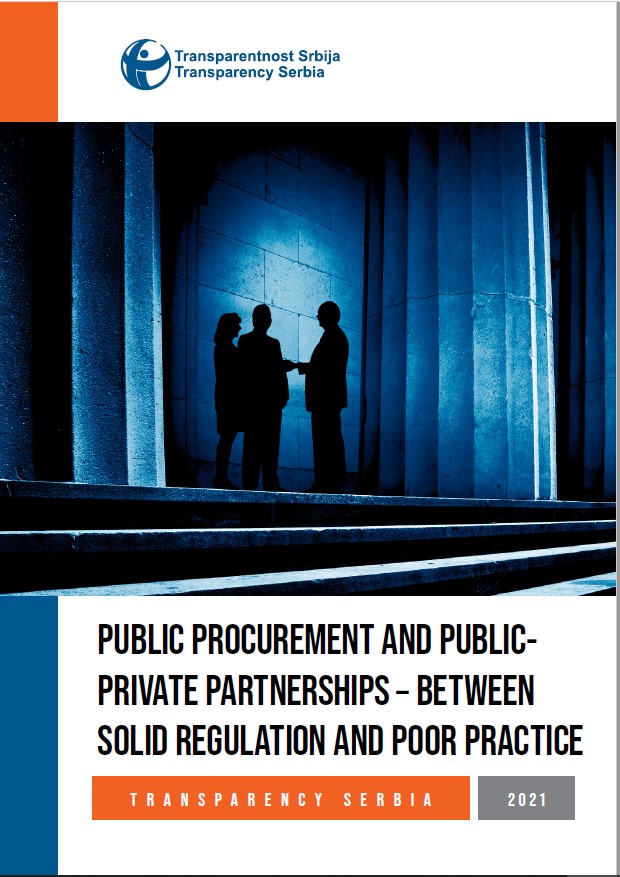 |
|
|
Transparentnost Srbija
ul. Palmotićeva 31
Beograd
Tel + 381 (0) 11 323 78 05
Faks +381 (0) 11 323 78 05
This email address is being protected from spambots. You need JavaScript enabled to view it.
www.transparentnost.org.rs
Priprema za štampu:
Transparentnost Srbija Beograd
TRANSPARENCY OF FINANCING OF ELECTION CAMPAIGN
PARTICIPANTS – DURING AND AFTER ELECTIONS
 |
|
|
Transparentnost Srbija
ul. Palmotićeva 31
Beograd
Tel + 381 (0) 11 323 78 05
Faks +381 (0) 11 323 78 05
This email address is being protected from spambots. You need JavaScript enabled to view it.
www.transparentnost.org.rs
Priprema za štampu:
Transparentnost Srbija Beograd
Grand Corruption and Tailor-made Laws in Serbia
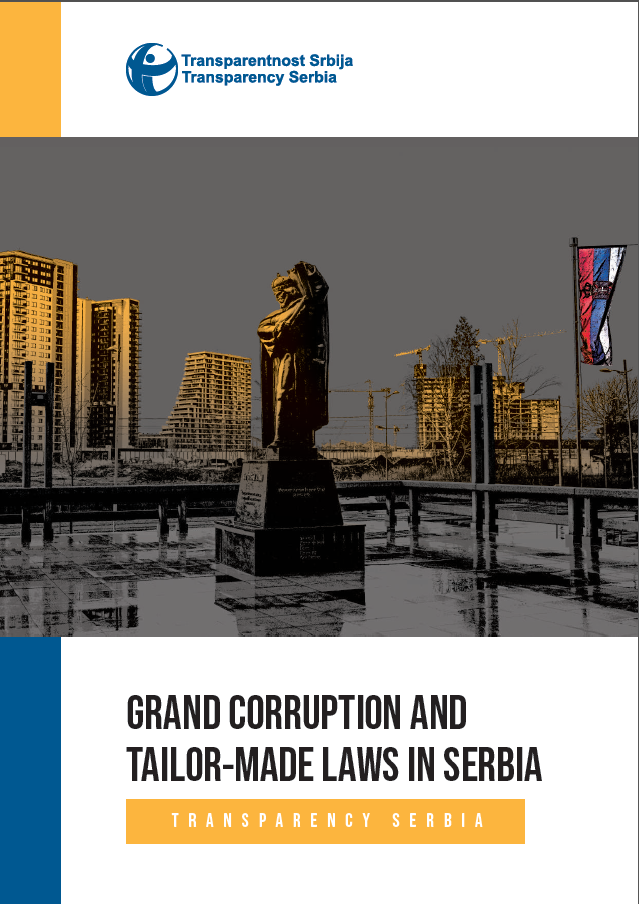 |
|
|
Transparentnost Srbija
ul. Palmotićeva 31
Beograd
Tel + 381 (0) 11 323 78 05
Faks +381 (0) 11 323 78 05
This email address is being protected from spambots. You need JavaScript enabled to view it.
www.transparentnost.org.rs
Priprema za štampu:
Transparentnost Srbija Beograd
Special law for state
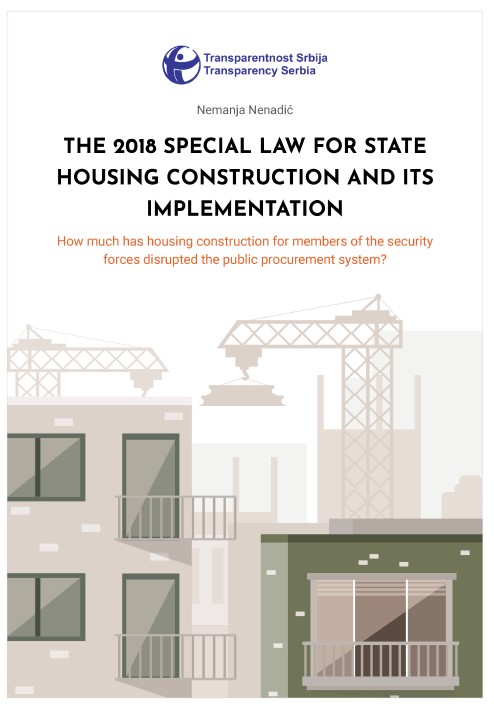 |
|
|
Publisher
Belgrade Centre for Security Policy
Transparentnost Srbija
ul. Palmotićeva 31
Beograd
Tel + 381 (0) 11 323 78 05
Faks +381 (0) 11 323 78 05
This email address is being protected from spambots. You need JavaScript enabled to view it.
www.transparentnost.org.rs
Autor
Nemanja Nenadić
Business integrity country agenda
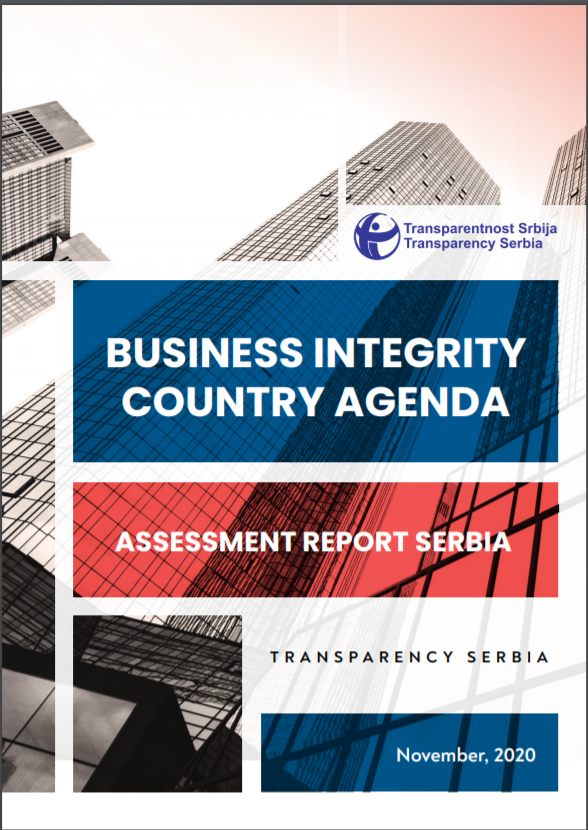 |
|
|
Publisher
Belgrade Centre for Security Policy
Transparentnost Srbija
ul. Palmotićeva 31
Beograd
Tel + 381 (0) 11 323 78 05
Faks +381 (0) 11 323 78 05
This email address is being protected from spambots. You need JavaScript enabled to view it.
www.transparentnost.org.rs
Autor
Nemanja Nenadić
Political influence on public enterprises and media
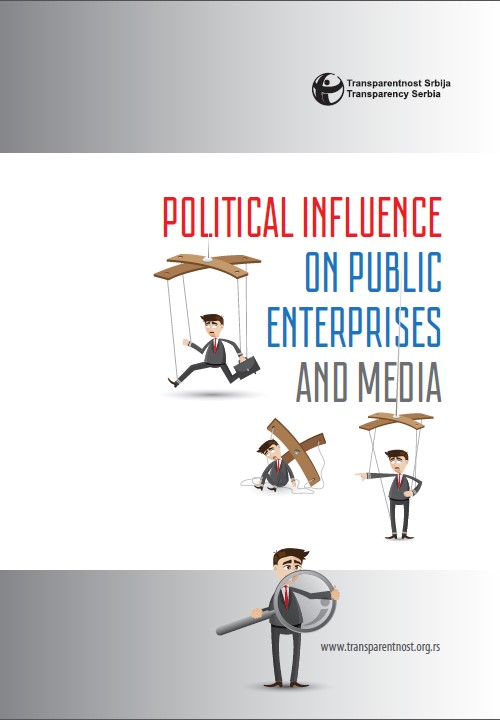 |
Political influence on public enterprises and media |
Transparentnost Srbija
ul. Palmotićeva 31
Beograd
Tel + 381 (0) 11 323 78 05
Faks +381 (0) 11 323 78 05
This email address is being protected from spambots. You need JavaScript enabled to view it.
www.transparentnost.org.rs
Priprema za štampu:
Transparentnost Srbija Beograd
Financing Presidential Electoral Campaign In Serbia 2004
A blow to political corruptionor preservation of status quo?
 |
|
|
Translators:
Olivera Ristanović (Introductory notes, chapters 1,2)
Nebojša Naumović (chapters 3,4,5)
Transparency Serbia (tables and annexes)*
Publisher:
Transparency Serbia
29. novembra 36/I
Belgrade
tel.: +381 11 303 38 27
fax: +381 11 322 81 96
ts@transparentnost.org.yu
www.transparentnost.org.yu
For publisher:
Branislav Miletić
Layout:
Transparency Serbia, Belgrade
Printing:
Arteast, Belgrade
Circulation:
200
ISBN: 86 - 84711-07 - 6
.............................................................................................................................................
* Translation of some legal DOCUMENTS, presented in Documentation Annex was made by, or in consultation with OSCE Mission to Serbia and Montenegro - legal translation unit.
.............................................................................................................................................
This book is a part of the project Promoting Democracy and Preventing Corruption implemented with the support from Westminster Foundation for Democracy. The stated views belong to the authors and do not necessarily present the opinions of Westminster Foundation for Democracy.
Conflict of Public and Private Interest and Free Access to Information
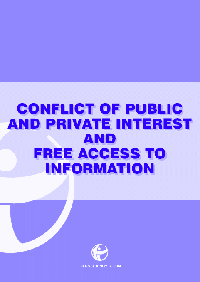 |
|
|
Publisher: Transparency Serbia
Project Manager: Vladimir Goati Ph.D.
Author: Nemanja Nenadic
Translators: Nebojsa Naumovic, Olivera Ristanovic
Content:
Preface
Conflict of Public and Private Interest
Free Access to Information
Results of Field Research
Conflict of Interest
Free Access to Information
What are Citizens Prepared to Do?
Summary
Preface
In much the same fashion as other transition countries in the region, Serbia is facing tremendous challenges during its transition period. Even when the government is seen to be
doing the "right thing", the success of the reforms to a large extent depends on whether the citizens believe that the adopted measures are justified. Naturally, if the significant part of the public sees the democratic institutions as corrupt, that trust is going to be eroded.
Therefore, the Transparency International believes that the government should win
the public support by:
1) Ensuring that the citizens and the MEDIA have easy access to the information related
to the government ACTIVITIES
2) Ensuring that state officials are not advancing their own private interests at the
expense of a greater public good
In this manner, the government is compelled to be more responsible and serve the
public interest, while reaffirming the value of the democratic institutions, thereby increasing
the public confidence in them.
The first step in this process is the adoption and enactment of relevant laws. For quite
some time now, the draft bills on the free access to information and the prevention of the
conflict of public and private interest have been waiting their turn for adoption in Serbia.
With the expectation that new and better legislation will soon be enacted, our organization
has decided to conduct a thorough analysis of the existing regulations in these two
areas. Through public mood surveys we have tried to ascertain to what degree are the
citizens familiar with these topics and to gauge the public interest in them, as well as to
they would deem to be adequate. The survey results will serve as a basis for our
future ACTIVITIES. Likewise, we believe that they could also prove beneficial to the public at
country prosper.
The reports in this publication represent only one portion of the Transparency Serbia
ACTIVITIES in the first year of the Accountability in the Western Balkans Program.
Moreover, the project has regional context as Transparency International national chapters
in four former Yugoslav republics take part in implementing it. The goal of the project
is to enable the civil society, in cooperation with others who are striving towards a society
founded on openness and accountability, to win the adoption of quality legislation and
subsequently monitor their implementation.
This project was made possible by the Finnish government acting under auspices of
the Stability Pact for South Eastern Europe Anti-Corruption Initiative (SPAI).
National Integrity System - Serbia and FR Yugoslavia
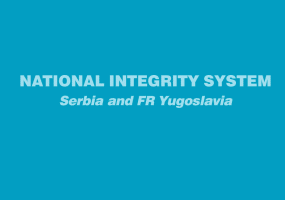 |
|
|
Publishers: Transparency International Serbia, European Movement Serbia
Editors: Predrag Jovanovic, Nemanja Nenadic
Contents:
Serbia - Questionnaire
Serbia - Narrative
FR Yugoslavia - Questionnaire
FR Yugoslavia - Narrative
Summary (a PDF format document)
Anatomy of Corruption
Summary
The book Anatomy of Corruption deals with the phenomenon of corruption using contemporary data, both theoretical and empirical.
In his book, author Dr Predrag Jovanović analyses new phenomena which have appeared over the past few years in countries in transition such as that of capturing the state. The issue here is a situation in which powerful financial groups "buy" MPs, politicians and even entire parties which then tailor the system and legislation in line with the interests of their backers. This phenomenon was particularly apparent in post-Soviet Russia when a powerful group of financial oligarchs virtually ruled Russia through politicians. This "capture" of the state happens in those countries whose institutions are weak. It is for this reason that Dr Jovanović points out steps which must be taken in order to avoid the grave fate of some transition countries which have failed to escape the clutches of the mighty financial oligarchies.
Dr Jovanović has devoted a special section of the book to the current process of privatisation in this country. In addition to an analysis of the latest Serbian Privatisation Act from the perspective of the opportunities for abuse which it hides, the book also presents the parallel experiences of Montenegro, which clearly indicate where danger lurks and how privatisation should not be carried out.
A considerable part of the book is devoted to a field which has been very little studied in this country but which will become all the more important in the future - public procurement. In his book, Dr Jovanović acquaints us with the basic principles on which public procurement must operate in order to conform to European standards. He also presents a detailed description of the ways in which abuse occurs in large investment projects throughout the world, including the experiences of developed countries. At the end of the chapter are listed measures which have proved effective in international practice in combating abuse in tenders and auctions.
A GRECO Paper: Corruption and Anti-corruption Policy in Serbia
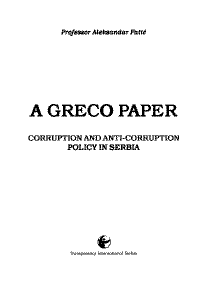 |
|
|
Publisher: Transparency International Serbia, Beolgrade 2001.
Author: Prof. Aleksandar Fatic
Contents:
Predrag Jovanovic
Foreword
General Approach
Offences and Sanctions
Procedure and Organisation
Preventive and Other Measures
Instruments for Fighting Corruption
National Integrity System Assessment Serbia 2015
Normal 0 false false false EN-US X-NONE X-NONE




















